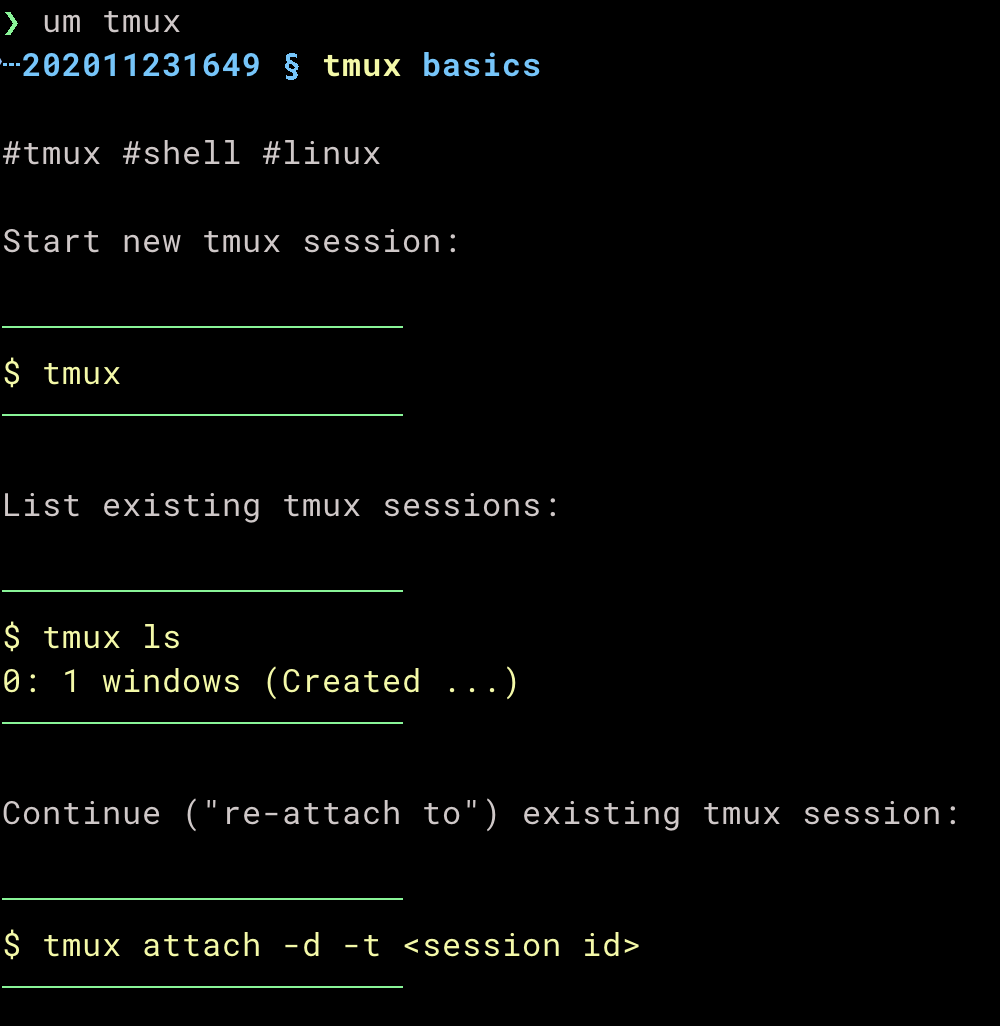Fetch Personalized Command Explanations with 'um' from Your Terminal
I stumbled upon this page: http://ratfactor.com/cards/um
Dave Gauer describes how he has a shell script, um, that he can use as a man replacement to help remember how to use a command. Dave’s implementation uses the cards} from his own Wiki, because the um pages there are “consolidated, I won’t forget about them, it’s easy to list, create, and update pages.” (To be honest, though, I can’t figure out where his um cards actually are, and what they look like.)
Since I’m using a Zettelkasten for all my stuff, I have notes that contain examples for commands I don’t use a lot, like ffmpeg. That’s just as powerful.
File Naming Scheme
Let’s say I want a result for um sed that produces helpful sed explanations and examples.
How do I identify the corresponding note?
- By file name:
- I should ignore the note’s ID;
- the note’s file name should contain explitic markers to identify the command;
- the file name should also be human-readable.
- Via index:
- Map the command name to an overview note.
- I could create a (Multi)Markdown table of key–value-pairs.
The file name option sounds simplest to implement: No need for a Markdown table parser. Then again, Marin Todorov has a package for that.
The naming scheme? Basically this:
ZETTELID § `COMMANDNAME` rest of readable title
For example:
202304181909 § `sed` command.md
- The
§, per my convention, denotes an overview of sorts. - Surrounding the program name in backticks works with my Markdown expectations.
- The human-readable string can be anything else.
I’d need to grep for "§ " followed by the search term in backticks. That’s simple:
$ find . -name "*§ \`sed\`*"
./202304181909 § `sed` command.md
Making a function of this:
um() {
find . -name "*§ \`$1\`*"
}
Then um sed produces the same filename.
But I don’t want filenames; I want content!
Pretty Printing of Markdown
The potato version would simply use cat or less (or the PAGER environment variable, if set).
I could also use mdcat to show rendered Markdown inside the Terminal. (Notably absent: tables and footnotes.)
um() {
find ~/Archiv/ -name "*§ \`$1\`*" | head -n 1 | xargs -I {} mdcat {}
}
I’m limiting the output of find to the first result, just to be sure, and then pass the filename to mdcat.
Note I changed the path to search in to my notes directory instead of .. Trailing slash required.

The output of um sed on my machine then is this:
┄202304181909 § sed command
#sed #shell
{{202211120933 Use sed and xargs -n2 to rename files.md}} {{202106211122 Use sed to prefix STDOUT.md}} {{201805011641 Use sed for stateful
replacements in text files.txt}}
This is just a concatenation of 3 filenames, you say?
You’re correct!
That’s because I need to figure out a way to transclude this overview to show all the atomic notes at once in a concatenated output.
Here’s a better example: um tmux.

That contains a couple of examples in the note itself.
File transclusion is tricky and even less standardized, so I’ll keep that as an exercise for future-me.